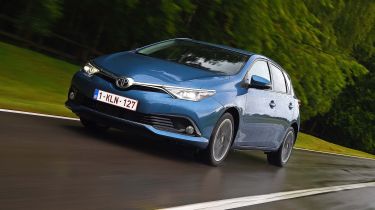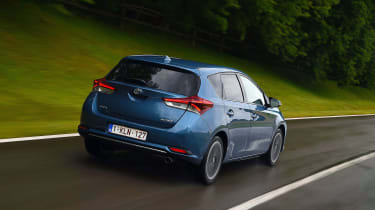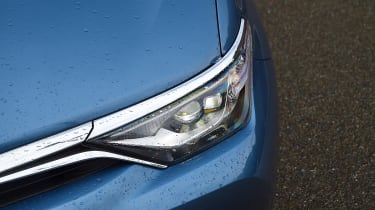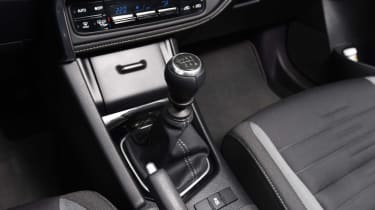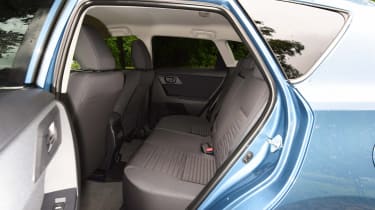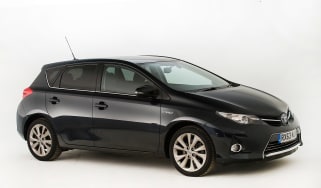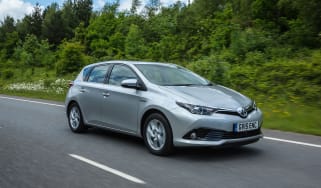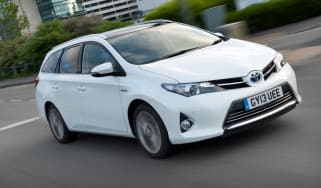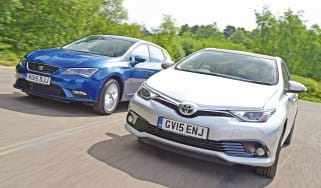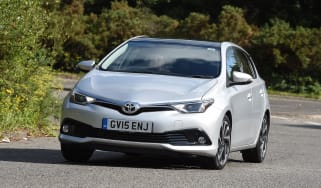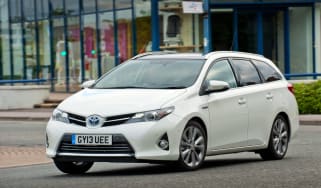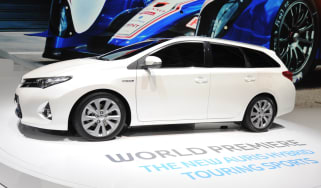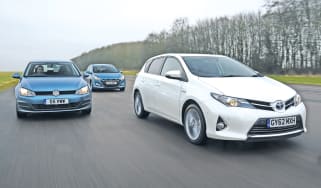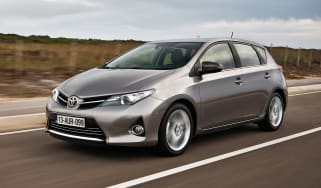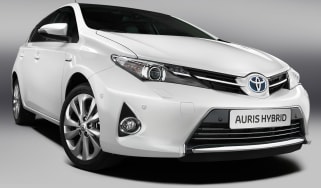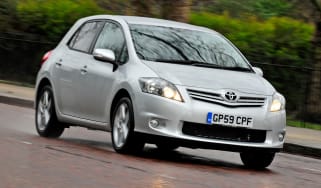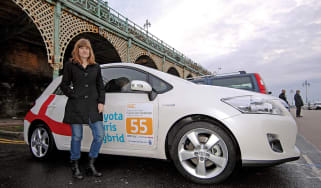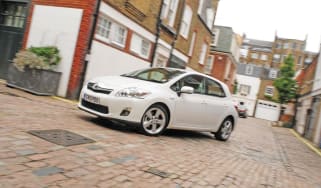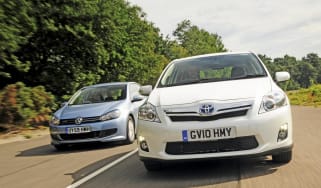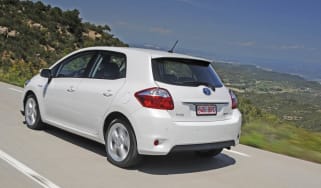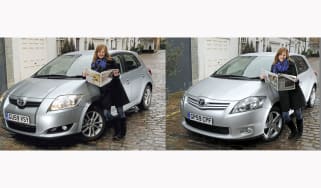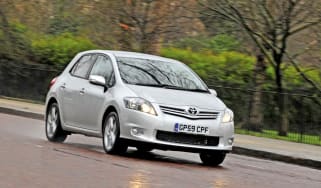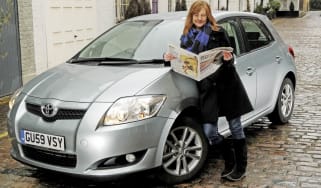Toyota Auris (2012-2018) review
For no-frills, dependable family motoring the Toyota Auris delivers, but it’s far from inspiring

The Toyota Corolla is an incredibly popular car, amassing more than 40 million sales since production started in 1966, making it one of the world's best-selling nameplates. In the UK, the name was replaced by Auris in 2006, and here we take a look at the second generation model, which was for sale from 2012-2018.
The first generation Auris debuted in 2006, before the original Auris Hybrid arrived in 2010, with Toyota becoming the first and only manufacturer to offer a choice of three powertrains in the family hatchback segment.
The Auris Mk2 is offered as a hatchback or Touring Sports estate – both of which were built at Toyota's plant near Derby. The second-generation model picks up where the old model left off in offering a no-frills, practical and reliable range of family cars.
Rivals include the Ford Focus, Vauxhall Astra, Nissan Pulsar, Peugeot 308, Kia Cee'd and Hyundai i30, although the hybrid version gives the Auris a major USP in this competitive segment.
• Best family cars on the market
A facelift was unveiled in 2015, with Toyota using the opportunity to add a new 1.2-litre turbocharged petrol engine to the range, making the Auris the first model to use this motor.
Six trim levels were offered, including a limited edition Hybrid GB25, launched to celebrate 25 years of building cars in Britain. Finished in a choice of three colours, the GB25 features black leather upholstery, 17-inch alloy wheels, rear privacy glass, full-colour multi-information display, automatic air conditioning, electric windows, push-button start and leather steering wheel and shift lever trim.
Used - available now

2021 FORD
TRANSIT CONNECT
100,000 milesManualDiesel1.5L
Cash £8,388
2024 VOLKSWAGEN
CRAFTER
100,000 milesManualDiesel2.0L
Cash £16,188
2024 VOLKSWAGEN
CRAFTER
139,000 milesManualDiesel2.0L
Cash £13,788
2024 VOLKSWAGEN
CRAFTER
100,000 milesManualDiesel2.0L
Cash £16,188The £24,000 Auris Hybrid GB25 comes complete with a '25 years building in Britain' badge to mark the occasion, along with the fitment of Toyota's excellent Safety Sense package, which is also standard fitment on all but the entry-level Auris Active, where it was offered as an option.
In-keeping with the Auris' dependable reputation it came with Toyota's five-year warranty, which means it makes a wise used purchase, as nearly new models will still have plenty of cover left.
The Toyota Auris was aware of its limitations in the family hatchback sector. Toyota gave up on pretending that the Auris could wow you with its handling, or cosset you in a luxurious interior. Instead, it concentrates where it knows it can compete - with a spacious, solid cabin, and a good reputation for reliability.
The 2015 facelift improved matters slightly, and added Toyota's excellent 1.2-litre turbocharged petrol engine to the line-up. But it didn't make the Auris any more stylish, so it's got no chance of competing for younger buyers against the likes of the Ford Focus, Volkswagen Golf or SEAT Leon.
Engines, performance and drive
The Toyota Auris has always erred on the safe and competent side, rather than offering any sort of driver appeal. That's no bad thing as it's reasonably comfortable and easy to drive, but so is a Leon or a Focus, and they both offer more in terms of steering feel and composure on the road.
The 2015 facelift saw tweaks to the steering rack to improve directness and feel, which were largely successful. New dampers also improve the low-speed ride, but body roll is still noticeable and it never feels like a car you would enjoy hustling along a country lane. Many Auris owners won't mind this, however.
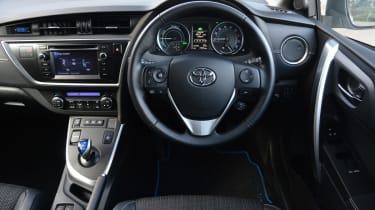
The new 1.2-litre turbo petrol is the highlight of the engine range: It improves efficiency significantly over the naturally aspirated 1.33 unit, and its 114bhp and 185Nm of torque mean it's flexible and strong. It's also smooth and refined at low revs, but a Leon 1.2 TSI has a broader power band, matches it for economy and sounds sportier.
The new BMW-sourced 1.6-litre diesel is better than the 1.4-litre unit and is punchy enough, but it's not especially refined. If a quiet drive is what you're after, then the Auris Hybrid should be a better option.
MPG, CO2 and Running Costs
There's no denying that the Toyota Auris is one of the more economical family hatches on-sale, but despite fuel saving technology, an aerodynamically efficient design and weight reduction, it's not quite the most efficient car in the class.
Unsurprisingly, the most economical engine (in official figures) in the Toyota Auris range is the 1.8-litre petrol-electric hybrid, and with its CVT automatic gearbox, it returns 81mpg and emits 79g/km. Unfortunately for Toyota who really pioneered hybrid tech, these numbers have been bettered by the Germans - the Volkswagen Golf BlueMotion manages 88mpg, although it emits more CO2.
The 1.3-litre petrol engine manages 52.3mpg with 125g/km of CO2, which is reasonable, but the 1.2-litre turbo is better in this regard. In Icon spec it manages 58.9mpg and emits 112g/km, slightly better than the SEAT Leon 1.2 TSI.
The lethargic 1.4-litre diesel engine improves for 2015, managing 80.7mpg and emitting just 92g/km. The 1.6 unit only manages 67mpg and 108g/km by comparison, but it is the better choice in terms of performance.
Interior, design and technology
Like the Volkswagen Golf and Ford Focus hatchbacks, the Toyota Auris uses the tried-and-tested two-box hatchback silhouette.
The design of the Toyota Auris is pretty angular and the nose features some sharp looking headlights as well as a small grille, which is dominated by a centrally mounted Toyota badge. It's functional and unfussy, but this isn't necessarily a bad thing, as the styling of the latest Golf could also be described as understated.
The 2015 facelift added extra chrome strips and new LED headlamps, which modernise things a little bit, but several key rivals are more dynamic-looking.
Toyota has carried over the straight-line theme to interior of the Auris, so while it feels pretty durable the hard, sometimes flimsy plastics disappoint and the dashboard could learn a thing or two from the ergonomically sound Volkswagen Golf - the switches are scattered across the dash and steering wheel, but one good thing is that the central touchscreen is easy to use.
The 2015 facelift added new gloss black trim on the dash and some new upholstery, but not much else is improved and it still lags behind the solidity, layout and classy feel of the best in the business.
Other minor niggles on the interior of the Toyota Auris include a clock that’s too far away from the driver and looks like it's from a 1980s digital watch. Meanwhile, the tray ahead of the gearlever, despite featuring 12V and USB sockets, is bit small.
The air-vent design looks a bit half-baked too, as there are two different versions - they’re rectangular in the middle of the dash, and the individual vents at either end are round.
Practicality, comfort and boot space
In hatchback form, the Toyota Auris features a decent 350 litre boot. It's smaller than the Leon and Golf, but 34 litres bigger than the Focus.
The rear seats split 60:40, and when folded, the boot space expands to 1200 litres. What's more, boot access is good thanks to a low, wide opening and the Toyota Auris has a shallow boot floor which makes unloading easier. A flat-floor can also be slotted into grooves behind the folded back seats to create a completely level loadspace.
There’s plenty of room to get in and out of the back and there’s more rear legroom than before, too. The Auris can carry four adults in comfort and five at a squeeze. It's not remarkable in either regard, however.
This version of the Auris has been developed as a hybrid from the start, so the batteries no longer take up any boot space. This makes the hybrid version just as practical as any other Auris.
Reliability and Safety
Toyota's reputation for building tough, reliable, long-lasting cars is almost legendary, so if a no-nonsense family hatch that won't let you down is your thing, then the Auris is well worth a look.
Toyota fits the Auris with seven airbags as standard, which includes a driver's knee bag. Other safety kit includes stability and traction control, Isofix child seat anchors, brake force distribution and brake assistance - no surprise then, that the Auris claimed five-stars in the Euro NCAP crash tests.
The Toyota Auris also ranked 43rd out of 75 cars in our 2017 Driver Power customer satisfaction survey, while in terms of manufacturers, Toyota ranked 11th out of 27 manufacturers.
The Auris also comes with a five-year, 100,000-mile warranty, which shows just how much confidence Toyota has in its car.
For an alternative review of the latest Toyota Auris Hatchback visit our sister site carbuyer.co.uk
